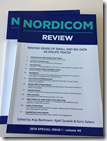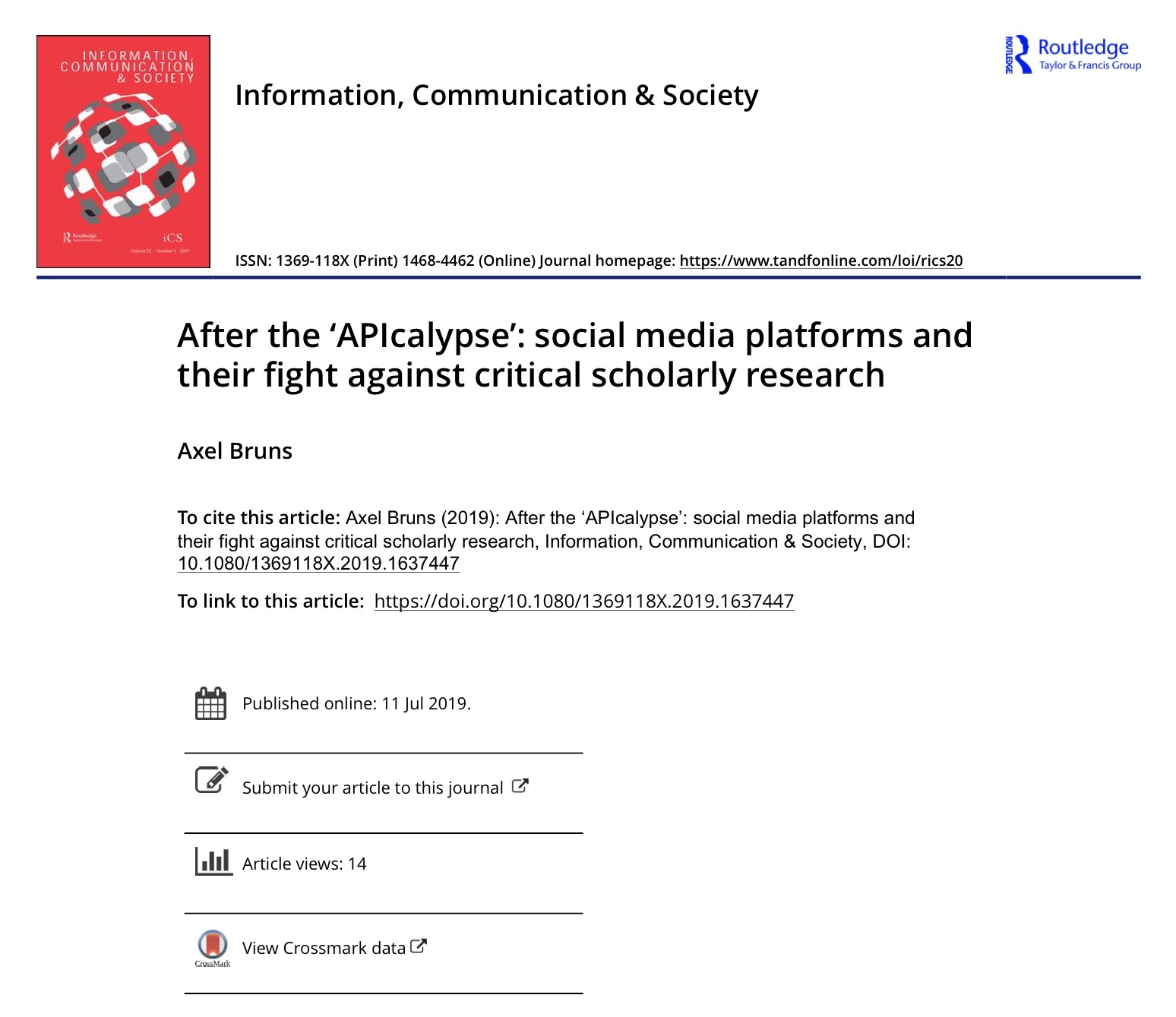You are here
A Round-Up of Some Recent Publications
Well, it’s mid-year and I’m back from a series of conferences in Europe and elsewhere, so this seems like a good time to take stock and round up some recent publications that may have slipped through the net.
Gatewatching and News Curation
But let’s begin with a reminder that my book Gatewatching and News Curation: Journalism, Social Media, and the Public Sphere was published by Peter Lang in 2018 and is now available from Amazon and other book stores. The book is the sequel (not a second edition) to Gatewatching: Collaborative Online News Production (2005), and updates the story of journalism’s transformation in the wake of sociotechnological transformations resulting from the rise of blogs, citizen journalism, and contemporary social media to the present day.
The focus here is especially on the way that gatewatching and newssharing practices on social media platforms such as Twitter and Facebook have changed audience activities around both breaking news stories and habitual news engagement, on the attempts by the journalism industry and by individual newsworkers to address and accommodate such changes, and on the implications this has for democracy and the public sphere as such.
Are Filter Bubbles Real?
My second new book, Are Filter Bubbles Real?, is something of an unexpected companion piece to Gatewatching and News Curation, and was published by Polity Books in 2019; it’s also available from Amazon, of course. As I wrote Gatewatching and News Curation, it became increasingly clear how much we are hampered, misled, and distracted from more important questions by the metaphors of echo chambers and filter bubbles that are no longer fit for purpose, and probably never were. From my conversations at the many conferences, I know that many of my colleagues feel the same.
In the book, I offer a critical evaluation of the evidence for and against echo chambers and filter bubbles. If, like me, you’re fed up with these vague concepts, based on little more evidence than hunches and anecdotes, this book is for you; if you think that there’s still some value in using them, I hope I am at least able to introduce some more specific definitions and empirical rigour into the debate. In either case, perhaps I will convince you that the debate about these information cocoons distracts us from more critical questions at present.
One Day in the Life of a National Twittersphere
 My perspectives on echo chambers, filter bubbles, newssharing, and gatewatching continue to be informed by my own empirical work, of course, and my colleague Brenda Moon and I have just published a new article in a special issue of Nordicom Review (available as open access, and as a pre-print here) that takes a new approach to the study of Twitter. Rather than beginning a priori with a topical or thematic focus, or studying the activities of a predetermined group of users, we drew on comprehensive data provided by the TrISMA: Tracking Infrastructure for Social Media Analysis project that I led, and sought to make sense of all the activities taking place in the Australian Twittersphere on an ordinary day (in March 2017).
My perspectives on echo chambers, filter bubbles, newssharing, and gatewatching continue to be informed by my own empirical work, of course, and my colleague Brenda Moon and I have just published a new article in a special issue of Nordicom Review (available as open access, and as a pre-print here) that takes a new approach to the study of Twitter. Rather than beginning a priori with a topical or thematic focus, or studying the activities of a predetermined group of users, we drew on comprehensive data provided by the TrISMA: Tracking Infrastructure for Social Media Analysis project that I led, and sought to make sense of all the activities taking place in the Australian Twittersphere on an ordinary day (in March 2017).
This enabled us to observe some of the expected phenomena: discussions about the political, cultural, and sporting events of the day; the activities of Australia’s considerable cluster of teen users; and the trending hashtags of the day. But we also found a remarkable amount of what we called ‘phatic sharing’: engagement amongst users that seems to address no particular topics, rarely uses hashtags, and seems mainly designed to maintain social connections, share images and links, and otherwise shoot the breeze. It’s a use of Twitter that we think has been largely overlooked in previous research, precisely because its lack of hashtags and other topical markers makes it so difficult to detect for conventional data gathering and analysis methods on the platform.
After the ‘APIcalypse’
 Sadly, though, such innovative, unconventional research approaches are increasingly frustrated by the lock-down of the Application Programming Interfaces (APIs) that used to provide access to social media data to commercial and research users. Many of these new restrictions are justified by the platforms with the need to better protect user data after the Cambridge Analytica scandal, but the lock-down has also had the very convenient side-effect of disabling critical, independent, public-interest scrutiny of platform activities precisely at a time when key issues such as abuse, hate speech, and ‘fake news’ would make such scrutiny especially important. The alternative access models and data lotteries that platform providers have promised to researchers are no sufficient substitute for proper API access, unfortunately.
Sadly, though, such innovative, unconventional research approaches are increasingly frustrated by the lock-down of the Application Programming Interfaces (APIs) that used to provide access to social media data to commercial and research users. Many of these new restrictions are justified by the platforms with the need to better protect user data after the Cambridge Analytica scandal, but the lock-down has also had the very convenient side-effect of disabling critical, independent, public-interest scrutiny of platform activities precisely at a time when key issues such as abuse, hate speech, and ‘fake news’ would make such scrutiny especially important. The alternative access models and data lotteries that platform providers have promised to researchers are no sufficient substitute for proper API access, unfortunately.
Building on my keynote at last year’s iCS Symposium “Locked out of Social Platforms” in Copenhagen, I’ve just published a new article, “After the ‘APIcalypse’: Social Media Platforms and Their Fight against Critical Scholarly Research” in Information, Communication & Society (pre-print here). Like the keynote, it is deliberately polemic and seeks to point out the duplicitous approach to working with researchers that several social media platforms have taken (Facebook is the worst offender here, but others are not far behind), and to sketch out a number of possible avenues that individual scholars and the broader community of researchers might pursue in response. In all this it seems critical to me that we maintain our pressure on the platform providers, and enlist policy makers as we do so, too.
Other Recent Outputs
These are the major new publications over the past few months, but of course there have also been a number of other conference presentations, book chapters, and journal articles. As usual, a full list of my outputs is available from the Presentations and Publications pages on this site, but I’ll highlight a handful of the most recent outputs here:
Axel Bruns. "Digital Public Spheres in Australia." In Aljosha Karim Schapals, Axel Bruns, and Brian McNair (eds.), Digitizing Democracy. New York: Routledge, 2019. 133-146.
Axel Bruns, Christian Nuernbergk, and Aljosha Karim Schapals. "What Journalists Share: A Comparative Study of the National Press Corps in Australia and Germany." In Anatoliy Gruzd et al. (eds.), Proceedings of the 9th International Conference on Social Media and Society. Copenhagen: ACM Press, 2018. 256–260. DOI:10.1145/3217804.3217924.
Axel Bruns. “Gatewatching Revisited: Habitualisation, Demoticisation, Normalisation.” Presented at ECREA 2018, Lugano, 1 Nov. 2018.
Axel Bruns. “It’s Not the Technology, Stupid: How the ‘Echo Chamber’ and ‘Filter Bubble’ Metaphors Have Failed Us.” Paper presented at the International Association for Media and Communication Research conference, Madrid, 10 July 2019. Full paper also available.
Christian Nuernbergk and Axel Bruns. “A Cross-National Comparison of Twitter User Interactions with Leading Political Journalists.” Presented at ECREA 2018, Lugano, 3 Nov. 2018.
- Snurb's blog
- Add new comment
- 22957 reads
 Printer-friendly version
Printer-friendly version



![Creative Commons Attribution-NonCommercial-ShareAlike 2.0 License [Creative Commons Attribution-NonCommercial-ShareAlike 2.0 License]](http://creativecommons.org/images/public/somerights20.gif)




